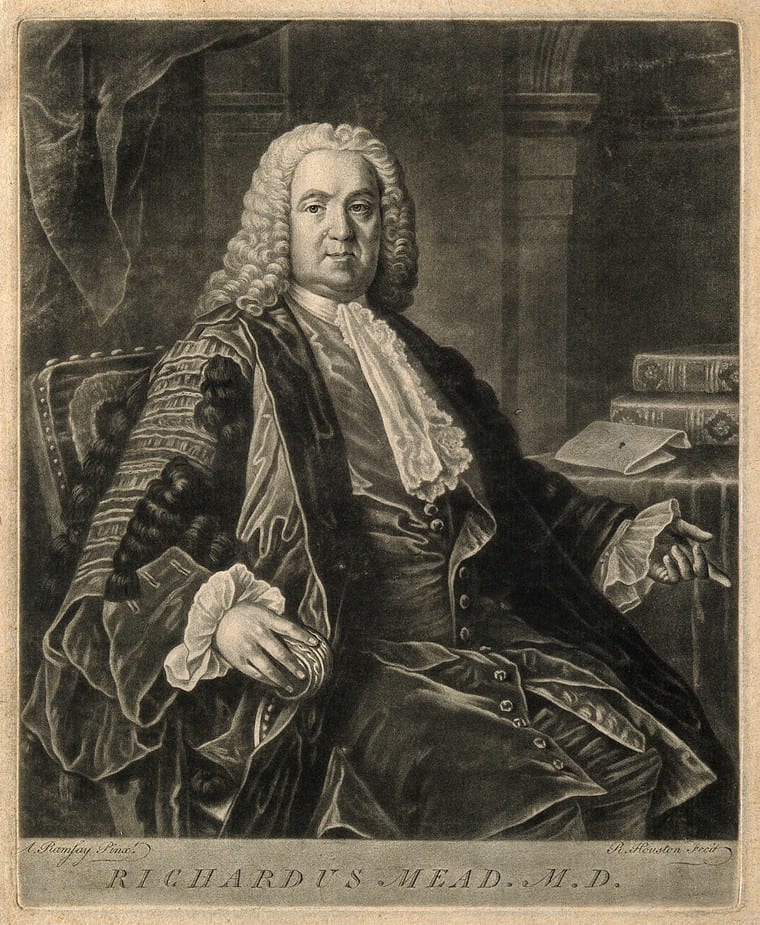Arpan K Banerjee
Solihull, UK
 |
| Richard Mead. Mezzotint by R. Houston after A. Ramsay. Credit: Wellcome Collection. (CC BY 4.0) |
Richard Mead was born on 11 August 1673, the eleventh child of Matthew Mead, a preacher and somewhat controversial character of his time.1 Matthew Mead was a scholar and Fellow of King’s College Cambridge, although he resigned from the latter post before being expelled by the authorities for the ill will he had generated. He preached in Stepney, London, preaching his last sermon in May 1699, the year of his death. He published several books and sermons but of particular interest is “Solomon’s Prescription for the Removal of Pestilence” in 1666, the year after the great plague of London. Both father and son were drawn to this topic of inquiry.
Richard Mead studied in Utrecht, Holland, for three years followed by Leiden, and obtained a medical degree in 1695 from Padua, Italy, which was then a great seat of medical learning. The following year he returned to London, where he established a flourishing private practice. He published his famous book Mechanical Account of Poisons in 1702,2 which resulted in admission to the Fellowship of the Royal Society the following year. His interest turned to infections and he published a paper on the parasitic origins of scabies in the Royal Society Transactions that year. He was also appointed to the prestigious job of physician at St. Thomas’ Hospital, one of England’s premier teaching hospitals and medical schools.3
He set about instructing students in anatomy, which would have been unusual for physicians to do instead of surgeons. Mead was an astute observer and meticulous and methodical in his note keeping. His interest in infections led him to observe that deaths from measles were often from secondary pneumonia. He was one of the earliest physicians to note this.3 Mead became a Fellow of the Royal College of Physicians and delivered the Harveian oration. He was an influential member of the hospital staff and believed that no one should be kept for more than four months in hospital. If longer stays were required, facilities should be created for long-term care.
In 1720 he published “A short discourse concerning Pestilential contagion, and the Method to be used to contain it”4 in which he argued that contagion was caused by a living agent spread from one person to another by contact with inanimate objects. He hypothesized that the plague was a contagious disease caused by a microscopic living animalcule.5 Today we know that plague is caused by Yersinia pestis, a bacterium discovered by Dr. Alexandre Yersin at the Pasteur Institute in 1895, and the disease is transmitted by the bite of an infected rat flea.6 London had been badly affected by a plague pandemic in 1665 and regular outbreaks occurred periodically throughout the next century in cities around Europe.7 In 1722 Daniel Defoe published his famous Journal of the Plague Year about the 1665 outbreak.
Mead retired from his post at St. Thomas’ Hospital in 1715. In 1718 Cheselden was appointed surgeon at St. Thomas’ Hospital and continued the anatomy instruction.3 These two men were the medical giants of their era and have been commemorated with busts, which generations of students have walked past in the long corridors of the hospital.
In 1721 Mead conducted research into smallpox inoculation and seemed to have anticipated Jenner by over sixty years.8 He was a sociable man and attended to the upper echelons of Georgian society, including Isaac Newton, Queen Anne, and King George II. He was also involved with charitable work, where he helped to start an on-site pharmacy at The Foundling Hospital9 (started by Thomas Coram in 1741), which was a home for orphaned and abandoned children.
In 1749 he wrote his last book, which was on scurvy,10 although he contributed to the book Pharmacopoeia with a collection of his prescriptions that were published posthumously. Mead was also a bibliophile, amassing a collection of around 10,000 books, which was sadly broken up on his death on February 16, 1754.
Mead and his successor Cheseldon helped enhance the reputation of St. Thomas’ Hospital, London as a center of medical excellence and learning, a reputation which continues to this day.
References
- https://en.wikipedia.org/wiki/Richard_Mead
- Mead R A mechanical account of Poisons 1702
- Mcinnes E M St Thomas’s Hospital 1963 Allen and Unwin
- Mead R A Short Discourse concerning Pestilence Contagion, and the Method to be used to prevent it. 1720
- Santer M The Cause of the Plague and Our Understanding of Airborne Diseases 2020 https://medium.com/science-uncovered/plague-and-our-understanding-of-airborne-diseases-b36ee74b9913
- Banerjee A.K A Brief History of Pandemics https://medium.com/history-uncut/a-brief-history-of-pandemics-d9f372c89484 2020
- De Lacey M Contagion Catches On: Medical Ideology in Britain 1730-1800 2017 Springer
- Pearce JMS The Gold –Headed Cane 2019 Hektoen International
- https://www.rcplondon.ac.uk/news/generous-georgian-dr-richard-mead
- Mead R On the Scurvy 1749
ARPAN K. BANERJEE, MBBS (LOND), FRCP, FRCR, FBIR, qualified in medicine at St. Thomas’s Hospital Medical School, London. He was a consultant radiologist in Birmingham from 1995-2019. He served on the scientific committee of the Royal College of Radiologists 2012-2016. He was Chairman of the British Society for the History of Radiology from 2012-2017. He is Treasurer of ISHRAD and adviser to radiopaedia. He is the author/co-author of seven books including Classic Papers in Modern Diagnostic Radiology 2005 and “The History of Radiology” OUP 2013.
Spring 2020 | Sections | Physicians of Note

Leave a Reply